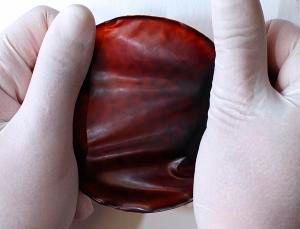 Save those food scraps – they could be your next grocery bag. A new way of turning vegetable waste directly into bioplastics could make such materials even more environmentally friendly.
Save those food scraps – they could be your next grocery bag. A new way of turning vegetable waste directly into bioplastics could make such materials even more environmentally friendly.
Current bioplastics are created by processing plant material to create short molecules called monomers, which link up to create long polymer molecules that make up plastics. Although the resulting material is usually biodegradable, making it a greener alternative to regular plastic, the way it is produced has come under criticism. Making bioplastics takes multiple steps, requiring more energy, and often uses crops that could otherwise be used for food, like corn or potatoes, says Ilker Bayer at the Italian Institute of Technology in Genova, Italy.
There may now be a better way. Bayer and his colleagues were looking at the process for creating cellophane, which involves passing cellulose, the material that makes up plant cell walls, through multiple acid and alkali baths. They discovered that dissolving cellulose from cotton and hemp in trifluoroacetic acid, a common chemical, converted it directly from its naturally crystalline form to an amorphous form suitable for moulding into plastic without the need for any further processing.
Parsley plastic
Next they tried the process on vegetable waste products, including rice hulls, cocoa pod husks (see image, above right) and spinach and parsley stems from an Italian company that powders vegetables for use in vegetable drinks and coloured pasta.
“These are the parts we don’t want to eat,” says Bayer. They could all be easily converted into useful bioplastics, with different properties based on the starting material: rubbery for spinach, but firmer for rice hulls.
The new materials have a different combination of stiffness and stretchiness compared to both existing bioplastics and traditional plastics. They can also inherit the properties of the original plant, meaning parsley plastic could have antioxidant properties, or cinnamon plastic could be antibacterial.
Source
Italian Institute of Technology, press release, 2014-07-24.
Supplier
Italian Institute of Technology
Share
Renewable Carbon News – Daily Newsletter
Subscribe to our daily email newsletter – the world's leading newsletter on renewable materials and chemicals









